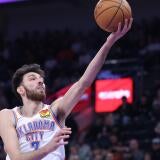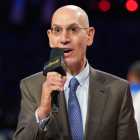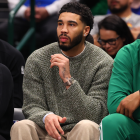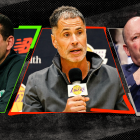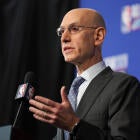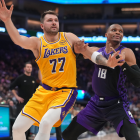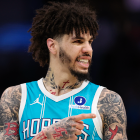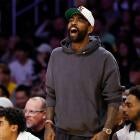As great as LeBron James has been, why has he been on so few truly great teams?
The King is undeniably one of the best players in NBA history, but not many of his teams are all-time greats
If we accept LeBron James is one of the two greatest players ever, players in that category make their teams elite -- even among champions -- and James' brilliant passing and standout defense make his teammates better, there is one nagging question: Why is it that James has been on so few all-time great teams?
Not only "pretty great that season," rather teams that stand the test of time and still are revered: The 1986 Celtics. The 1996 Bulls. The 2017 Warriors. That level, referred to from here on out as a Great team, with capital "G."
This exercise by no means is designed to disparage James, and we must note his career is nowhere near over. There is no debating his three championships (and three Finals MVPs), four regular-season MVPs, 13 All-NBA teams, 13 All-Star appearances, one scoring title, six times on the All-Defense team and individual performances and consistency built around a game that makes his teammates better cement greatness. He's certified fresh on Rotten Tomatoes.
But why is it so few of his teams are viewed as all-time Great? Before we get to the reasons why, let's look at his teams that might be in the running, with a couple of qualifiers:
- Team had to appear in the NBA Finals; didn't need to win it all, provided it lost to a Great team.
- Dominance in playoffs AND the regular season; the total résumé counts.
Here are his Finals teams:
2007 Cleveland Cavaliers (50-32, 2nd in East, plus-3.7 net rating, 7th league-wide)
Great team? Absolutely not
Consider it a precursor to the James debate, as he dragged the league's 19th-best offense to the Finals because he did this, on the road in a 2-2 series vs. the Pistons, who were making a fifth straight Eastern Conference finals appearance.
James turned 22 that day.
The Cavs were summarily swept by Tim Duncan and the Spurs, with whom James would become well-acquainted in later Finals. The Cavs' second-leading scorer that season was Larry Hughes. Drew Gooden was their leading rebounder. Damon Jones led the team in 3-pointers per game, and Daniel Gibson led the team from behind the arc in the playoffs. That's "Boobie" Gibson, whose career ended in 2013 at age 26.
Needless to say, getting swept in the Finals is not passing the muster as a Great team.
2011 Miami Heat (58-24, 2nd in East, plus-8.5 net rating, No. 1 league-wide)
Great team? Results outweigh the process
Stats matter, that's why net rating is used. But stats must be considered in context. The Heat had the best net rating in the league, meaning that per 100 possessions, they beat their opponent by more than any other team. But the Bulls edged them for the No. 1 seed. Granted, the Heat smoked MVP Derrick Rose and Chicago in the East finals, but Miami was third in offense and fifth in defense per 100 possessions in the regular season.
But the conversation around this team was a dichotomy of awe and skepticism. Their talent was absurd, with James, Dwyane Wade, Chris Bosh and a solid cast of vets. But they never figured out how to play together. And the emotional strain of being labeled villains helped them fall apart at the worst time, during the Finals against an unkillable Mavericks team:
The Heat could (and probably should) have won that series (just as the Thunder probably should have won the Western Conference finals). But that Mavericks team was special. They played with so much freedom, confidence, precision and joy -- oh, and Dirk Nowitzki was unquestionably the best player on the floor in every game during that run.
That Heat roster also was shockingly thin. Mike Bibby, at 32, was the starting point guard in the regular season and Finals. Joel Anthony became a full-time starter, and two years later he was a non-rotation player. They had no shooters outside of James Jones and Mike Miller, and hadn't realized their small-ball potential.
A Great team can lose in the Finals, but not when losing a Finals it should win and when its best player -- James -- falls apart. The Heat learned from those painful Finals, but that team -- though fascinating -- was not Great.
2012 Heat (46-20, No. 2 in East, plus-7.2 net rating, 3rd league-wide)
Great team? Just barely
It's amazing what adding Shane Battier and turning James into a post-up dragon can do for a team. The 2012 Heat removed the burden from James' back, securing his first title and taking him off the list of legends without a ring. James was singularly incredible that season, even when stacked up against his other storied seasons. He posted up as he never had before, and with the villain label off his back, he rekindled his love for the game.
This was the year of his most defining non-Finals game, the famous Game 6 in Boston, when he scored 45 on a flurry of jump shots. But it often gets lost just how complete his game was at both ends, as shown in games like this:
This team is borderline great, and it's tempting to give it the benefit of the doubt. The Heat beat a very good Pacers team and ended the Celtics' last stand, then beat the Thunder with Russell Westbrook and Kevin Durant in what many figured would be the start of an annual Finals rivalry but never was repeated. Battier brought a shooter who could defend, the team finally started to embrace small ball after Erik Spoelstra convinced Pat Riley it could work, and Mario Chalmers stepped into his role as team punching bag and steady point guard.
There are arguments against this team making the Great cut. OKC was inexperienced and not Finals-ready. And if James does not come through in Game 6 at Boston -- an elimination game -- shudder to think what might have happened to his legacy. But he did what great players do to make their teams Great (for our purposes), so this squad narrowly passes the test.
2013 Heat (66-16, No. 1 in the NBA, plus-9.9 net rating, 2nd in the NBA)
Great team? 100 percent
The 2013 Heat rattled off 27 straight regular-season victories, the third-longest run in league history. They dominated the first two rounds against the Bucks and Bulls before beating an underappreciated Pacers team. Take off some shine because of how close they came to losing in the Finals? Not when considering how incredible that Spurs team was. That series might have been the best -- in terms of execution by two teams over seven games -- in Finals history.
It was a knock-down, drag-out pure-basketball tactical slobber-knocker from start to end featuring so many future Hall of Famers you need two hands to count 'em. It gave us maybe the best individual shot in NBA Finals history -- Ray Allen's OT-forcing 3-pointer in Game 6. That Heat team dominated until the Finals, then went toe to toe with one of the best teams we'll ever see and won. Legendary squad.
2014 Heat (54-28, 2nd in the East, plus-6.1 net rating, 4th in the NBA)
Great team? Nope
Same squad, but at its end. The Heat were on fumes. Miller and Battier were past their career expiration dates and Allen wouldn't play another game after the Spurs knocked them off in five. James was great, his Finals numbers were still astronomic (28.2 ppg, 7.8 rpg, 4.0 apg, 57.1 FG pct, 51.9 3-pt FG pct). But a once-great team had the sense that James might be moving on (back to Cleveland) and the veterans just didn't have it, especially in the face of the 2014 Spurs, who were motivated by the pain of losing the year before and reeled off one of the most electric shooting performances in Finals history.
The Heat had the fourth-best effective field goal percentage in Finals history, and the Spurs were six percentage points better in that category. Splash Brothers, Schmash Brothers. This Heat team was not Great in closing the second act in James' career.
2015 Cavaliers (53-29, 2nd in East, plus-3.7 net rating, 7th in the NBA)
Great team? Not from what we know
The injuries the Cavs suffered in the playoffs to Kevin Love and Kyrie Irving complicate matters, because had they won the Finals, the reflection obviously is different. But it's important to remember how dysfunctional this team was. They were under .500 in November, struggled much of the season and endured drama the entire way.
Oddly, the roster might be better than the club that (spoiler alert) won it all the next season because this team had Shawn Marion and other veterans. But this team never really clicked, despite rolling through the East.
2016 Cavaliers (57-25, 1st in East, plus-5.8 net rating, 4th in the NBA)
Great team? Close, but more memorable than Great
They won the title and pulled off the greatest comeback in NBA playoff history, and that cannot be taken away. But falling into that 3-1 hole cannot be discounted, and they needed a miracle to pull it off. Their postseason dominance deserves recognition, and they did finish top 10 in offense and defense. There's a case to be made, but it's hard to identify what made this unit Great beyond James' individual brilliance and some big shots from Irving.
Additionally, this team struggled to the point of firing its coach, even with the No. 1 seed in place, and had constant moments of disappointment and concern before turning it on in the playoffs. While they slammed though the Eastern Conference, none of the series were against particularly impressive teams -- save Toronto sneaking out two wins. This Cavs team goes down as one of the most memorable in Finals history, but not truly Great.
2017 Cavaliers (51-31, 2nd in the East, plus-2.9 net rating, 8th in the NBA)
Great team? Does not past the test
This squad was even more impressive than the previous season in the East playoffs. Yet there are lots of blemishes on the résumé -- lost to the Warriors in five, fully healthy; ranked 22nd in defense in the regular season; finished with the fifth-best overall record (tied for that with three other teams, to boot; including the Jazz and Clippers). That can be dismissed as not caring about the regular season much the same way the early 2000s Lakers approached the season. But the prime issue from the regular season (defense) remained in the Finals, albeit against an all-time juggernaut.
In the end, no one will talk about this team in hallowed terms.
Reasons why James has been on so few Great teams
OK, so we've established there's only one no-question great team, one maybe-so in 2012 and one likely-not in 2016. If we give all three the benefit of the doubt, three of eight Finals teams is a pretty good chunk. And the 2009 team, which tripped vs. the Magic (the "right team in the right place at the right time" that season), definitely would have been Great (and maybe James would have won his first title and never left Cleveland, but we digress).
For a player at James' level, it's surprising there's only one lead-pipe Great team. When talking about other great players, Jordan probably had four (1991, '96, '97, '98), maybe five ('93) at most. Kobe Bryant has probably only two teams (2001, '09, maybe '08). Bird and Magic had theirs (1984-88, maybe the 1981-82 stretch). The Warriors have had three straight, which is what makes their run more remarkable. But these teams don't happen very often. The question is whether they have happened less with James' teams than you would expect.
What are the possible reasons for this phenomenon?
Luck: A great team plays together with chemistry and sacrifice. It needs a healthy and balanced roster with everyone clicking at the right time. It should dominate weak opponents and take care of enough strong ones to validate the résumé. That it hasn't happened more, for something so admittedly subjective, isn't reflective of anything more than happenstance.
The modern CBA: Free agency is a problem. With a salary cap, max salaries, the luxury tax punishing owners for keeping super-teams together and more player movement in general, James came up in a time when continuity doesn't exist as in previous eras. Most veterans don't stay on the same team for more than four years. That, combined with short coaching tenures, makes building a foundation difficult.
Something inherent in James' game: He learned how to be a leader in Miami, but it took him nine years to learn the lessons he needed to get there. He can take a game over, but rarely does it the way other scoring greats have. His competitive spirit has always taken a backseat to his drive toward team cohesiveness and integrity. He's not usually mentioned among the most competitive players to ever play. That doesn't mean he's not competitive, it means he doesn't look for his shot as often as some guys on that most-competitive list (Jordan, Bryant) did.
Because of his team-first approach, he needs consistency from supporting players. Shooters need to knock down key shots because James is creating those looks. Supporting defenders need to be lights out because James can't do everything. It creates pressure that is not alleviated by more equal distribution of opportunities because James has the ball most of the time (not to mention secondary stars like Irving and Wade pounding the air out of the ball, too).
Failure to construct supporting rosters: The Cavaliers built a title team around James, but did so with two players who are defensive liabilities in Irving and Love. All teams have supporting guys with holes, even the Warriors, but the Cavs have relied on guys like Richard Jefferson at the tail end of his career, and J.R. Smith reinventing himself to get where they needed to go. Miami's ownership balked at the luxury tax for Miller, which helped set in motion James' departure.
All of these reasons probably contribute, but none seem too definitive. As noted at the outset, James is not done yet; he probably has at least another four years of top-level play, given what kind of physical shape he's in and how his game continues to evolve.
There is no viable criticism of James. More than anything, it seems to suggest how rare it is to really have one of those truly Great teams. The 2000-2001 Lakers were dominant but 21st defensively. The 2009 Celtics were probably better than the 2008 title team, but Kevin Garnett went down with injury. The 2013 Thunder were capable of being Great, but Westbrook's injury hit.
For all of James' individual brilliance, how many Great teams did his teams face in the Finals? The 2012 Thunder might qualify, but the 2013 and '14 Spurs and the 2015, '16 and '17 Warriors definitely qualify. James has faced at least five Great teams in the Finals, and that's becoming a defining element of his career. His greatness amplifies that of the opponents who defeat him. While James might be on only one (for sure) of the best teams of all time, his career in the Finals is a reflection of the teams he has faced. And that doesn't seem likely to end, because we're seeing a stretch of incredible teams from the West in the Spurs and Warriors -- quite possibly unlike anything we've ever seen.


